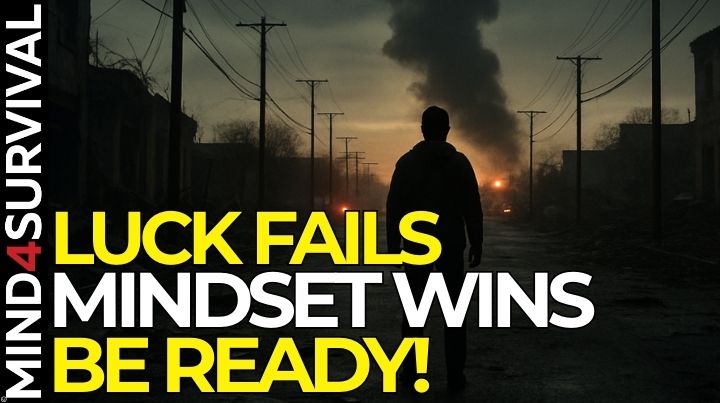41: How to Cultivate Your Prepper Mentality


Podcast: Play in new window | Download
Your prepper mentality will do more to keep you safe than all the gear, food, and weapons in the world. This episode features former CIA Clandestine Services Case Officer, Doug Patteson, of IngloriousAmateurs.com. Doug brings a wealth of knowledge and experience into play as he helps you improve your everyday prepper mentality to become more safe, secure, and prepared.
Focus on the Prepper Mentality Basics
The prepper mentality basics apply whether you’re an expert with tons of experience, or a new person just figuring out preparedness. Experts, such as professional athletes, etc., regularly work on the basics to improve their high-level efforts. Improving yourself requires focus, dedication, and realism. It just doesn’t happen on its own.
People must first determine what risks they are facing by doing a personal risk, threat, and vulnerability assessment. That can be as simple as asking yourself what you are doing, what are you protecting, what are you protecting it with and what are you protecting it from.
Target-Proofing
You can’t make yourself target-proof. Target-proofing is making yourself invulnerable, which isn’t 100% possible. What you can do is make yourself a less desirable target. This is achieved by making yourself a harder, more difficult target.
Criminals are, by their nature, lazy. Rather than work and do the usual grind, they choose to prey upon others. When preying on others, they want to get the easiest bang for their buck. Therefore, if by your actions, you present a more difficult target they are likely to avoid you and opt for an easier mark.
Situational Awareness Is Essential to Your Prepper Mentality
To make yourself a more difficult target, you can focus on your situational awareness. This starts with your prepper mentality and its focus on awareness. You should assess what possible threats are within your immediate environment.
Start by asking yourself how you could handle each of those threats. Determine the areas in which you’re less secure and more secure. Think about what you can do to strengthen yourself and your situation.
Ask Others for Their Opinions
When working to determine your vulnerabilities, engage others. Ask your friends, your spouse, or join social networking groups and find out what others think. Asking for others to weigh in helps develop your plan into a better course of action. Ask them what makes you seem like a good target for a criminal and do what you can to minimize that. Don't forget to find out what you're doing right, too!
It’s necessary to be deliberate in how you face the day when working to maximize your prepper mentality. You should make a conscious effort to approach each day with a fresh mindset. Going about your day on autopilot and not paying attention is a recipe for trouble.
Take Deliberate Action to Increase Your Prepper Mentality
Taking deliberate action in your daily life consists of a few steps.
- The first step is recognizing that we live in a hostile world.
- Secondly, you need to understand that all of us have the potential to be the target of a predator.
- Third, affirm to yourself that you don’t want to be a target, so you have to recognize steps one and two, and approach your day differently as a result.
- Finally, evaluate how you want to approach the day differently, so you reduce the likelihood of a threat affecting you.
Take these steps when entering new settings and situations.
Get Over the Fear of Offending People
One of the most significant mindset challenges that impact your safety is overcoming the fear of offending others. If something inside of you is telling you that you’re in a lousy situation, listen to it. Your intuition, instinct, etc., is usually right. However, many people are afraid that if they listen to their intuition and act accordingly, they’ll offend someone. Unfortunately, when people don’t listen to their instincts and continue down the path they are headed on, bad things often happen.
We often let the fear of seeming judgmental impede our internal warning system. That warning system, aka our instincts, developed itself into our internal survival tool. It’s there, it works, and we should listen to it. Remember, when acting appropriately to a threat, you are doing what is prudent and not what is judgmental.
Staying Safe Without Mental Overload
Don’t let yourself become overwhelmed. Think about your threats by taking them in small chunks. We all have a good idea of what our higher threat and risk factors are. For example, driving a car in Friday rush hour traffic is more dangerous than driving in Sunday morning traffic. Therefore, you may mentally need to prepare more for the Friday drive than you will for the Sunday drive. In that way, you can keep your mind from being overwhelmed.
An excellent way to exercise your prepper mentality is to run through potential threat scenarios in your mind. For example, when you walk into a building, take a minute to assess the situation. Look for things like where are your exits. Examine the crowd to see if anyone stands out as possible trouble. How are the staff, etc.? Pre-plan a few quick reactions to emergencies, so you’re ready if things go wrong. It’s good to remember that statistics show that those who pay attention to their environment are more likely to survive a dangerous situation.
The Rule of the Stupids
Remember these simple rules.
- Don’t do stupid stuff…
- With stupid people…
- In stupid places…
- At stupid times of the night!
The idea of the rule of the stupids is that there are bad things that happen around the world at certain times. While you can't control the other people involved, there are things you can control. You can control who you’re with. You can control where you go and when you go there. In other words, if you don’t put yourself in a dangerous situation, you won’t suffer the effects of that unfortunate situation.
You may be fine if you violate one of the rules of the stupids. However, as you break more of the rules, the risks increase exponentially. It’s up to you whether you limit the impact of the rule of stupids on yourself.
The Biggest Challenge to Your Safety
The most significant challenge to your safety is, “It couldn’t happen to me!” (Aka: normalcy bias) Sometimes it takes a significant event or a personal tragedy to make people understand bad things can happen to anyone.
If you suffer from normalcy bias, it’s important to work your way out of it. One way to do so is by understanding Cooper’s Colors. Cooper’s Colors is a system that uses colors to designate your level of awareness and ability to take action. Additionally, it’s important to understand what your body does as you escalate your reaction to a severe situation. For example, increasing heart rate, loss of fine motor control, etc., all impact your abilities to overcome the event. Knowing in advance what happens to you physiologically will help you improve your prepper mentality and better deal with adversity when it happens.
One way to improve your awareness is learning the difference between passive and active mindsets. (More on that in a second.) Another is understanding the fight, flight, or freeze reactions your mind and body may have when things go wrong. Next, engage in scenario analysis (what-if talks) with others and learn from their experiences.
Passive vs. Active Mindset
A passive mindset is when you’re allowing the world to happen around you or to you.
An active mindset is when you’re deciding how you’re going to interact with the world.
It is easy to fall into the trap of a passive approach to life. Humans typically take the path of least resistance. In this case, that path is the passive mindset path. Have you ever zoned out at a traffic light and not paid attention to what is happening around you? If so, you were in a passive mindset.
Had you been in an active mindset, you would have identified some personal environmental factors. Some of the things you’d notice are how many cars are in front, behind, and next to you. You would see where the median is, or how tall the curb is. How about how much space is between you and the cars around you. This information is all achieved through having an active mindset and preparing to take action.
How to be Safe and Secure in an Unfamiliar Area
The first step to becoming more safe and secure in an unfamiliar area is to remind yourself you’re not in a familiar area. The simple acknowledgment that you’re in an unknown area is enough to help switch your brain towards an active mindset. Try saying it to yourself out loud and see what doing so does to your mindset.
Then adjust to your prepper mentality and begin to familiarize yourself as quickly as possible by noticing your surroundings, the people around you, and possible exit routes or safe locations. (Remember, it's important to run toward safety, not just away from danger.)
How to be Safe When Dealing with People
Look for signs that tell you something or someone is out of place. You can achieve this when you understand the environment you’re in and look for clues to tell you what’s happening. Ultimately, you’re looking for something that isn’t normal.
Look at how are people dressed. Have they dressed appropriately for the time of day, the environment, location, etc.? What are they doing with the hands and eyes? Does their demeanor tell you anything?
Your mind will pick up on cultural clues and put the information you’re receiving into the context of the situation. In other words, your mind is going to take you past experiences and use them to interpret the situation. At some level, your mind will know something is not normal. When that happens, it’s up to you whether to accept what your mind tells you or not. Remember the most significant challenge that we went over earlier?
Doug Patteson’s Prepper Mentality Tips
These are the tips to take away from Doug.
- Don’t live in fear. Bad guys want you to live in fear. Rather than live in fear, take active ownership of your life.
- Pay attention to what is going on around you. Stay aware and be vigilant.
- Listen to your instincts. If something doesn’t seem right, pay attention to it.
- Make yourself a slightly harder target than the next person.
- Change your mindset, so you don’t walk in fear, but so you walk in confidence.
The Bottom Line About Cultivating Your Prepper Mentality
The most important part of being prepared is in between your ears. Constantly strive to improve your prepper mentality by assessing your surroundings, thinking about what could go wrong, and creating a quick plan for those eventualities. You might have to make a conscious effort to do this at first, but the more you practice it, the more natural it will become for you.
Because we can learn from one another, we want to know what you think. What are your thoughts about cultivating your prepper mentality? Tell us in the comments below and let's get everyone better prepared!
Stay safe,

Related Articles
FREE Guide
Read the Best Seller
Join Mind4Survival
Stay informed by joining the Mind4Survival! 100% Secure! 0% Spam!
Affiliate Disclosure...
Mind4Survival is a free, reader supported information resource. If you make a purchase through our link, we may, at no cost to your, receive an affiliate commission.
Do You Want To Be Ready No Matter What?

Download our free 39-page guide with interactive, 7-Day Emergency Kit Checklist and take the first step toward real preparedness.
- Know exactly where to start.
- Save time and money.
- How-to build a complete Basic Emergency Kit.
- Level up your safety and security.
Join Mind4Survival
Stay informed by joining the Mind4Survival! 100% Secure! 0% Spam!





